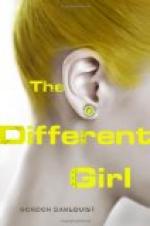But, apart from any such mystical compensation, Margaret’s great reward was that she knew her beautiful old mother better than any one else in the world knew her. As a rule, and particularly in a large family, parents remain half mythical to their children, awe-inspiring presences in the home, colossal figures of antiquity, about whose knees the younger generation crawls and gropes, but whose heads are hidden in the mists of prehistoric legend. They are like personages in the Bible. They impress our imagination, but we cannot think of them as being quite real. Their histories smack of legend. And this, of course, is natural, for they had been in the world, had loved and suffered, so long before us that they seem a part of that antenatal mystery out of which we sprang. When they speak of their old love-stories, it is as though we were reading Homer. It sounds so long ago. We are surprised at the vividness with which they recall happenings and personalities, past and gone before, as they tell us, we were born. Before we were born! Yes! They belong to that mysterious epoch of time—“before we were born”; and unless we have a taste for history, or are drawn close to them by some sympathetic human exigency, as Margaret had been drawn to her mother, we are too apt, in the stress of making our own, to regard the history of our parents as dry-as-dust.
As the old mother sits there so quiet in her corner, her body worn to a silver thread, and hardly anything left of her but her indomitable eyes, it is hard, at least for a young thing of nineteen, all aflush and aflurry with her new party gown, to realize that that old mother is infinitely more romantic than herself. She has sat there so long, perhaps, as to have come to seem part of the inanimate furniture of home rather than a living being. Well! the young thing goes to her party, and dances with some callow youth who pays her clumsy compliments, and Margaret remains at home with the old mother in her corner. It is hard on Margaret! Yes; and yet, as I have said, it is thus she comes to know her old mother better than any one else knows her—society perhaps not so poor an exchange for that of smart, immature young men of one’s own age.
As the door closes behind the important rustle of youthful laces, and Margaret and her mother are left alone, the mother’s old eyes light up with an almost mischievous smile. If age seems humorous to youth, youth is even more humorous to age.
“It is evidently a great occasion, Peg,” the old voice says, with the suspicion of a gentle mockery. “Don’t you wish you were going?”
“You naughty old mother!” answers Margaret, going over and kissing her.
The two understand each other.
“Well, shall we go on with our book?” says the mother, after a while.
“Yes, dear, in a moment. I have first to get you your diet, and then we can begin.”
“Bother the diet!” says the courageous old lady; “for two pins I’d go to the ball myself. That old taffeta silk of mine is old enough to be in fashion again. What do you say, Peg, if you and I go to the ball together ...”




